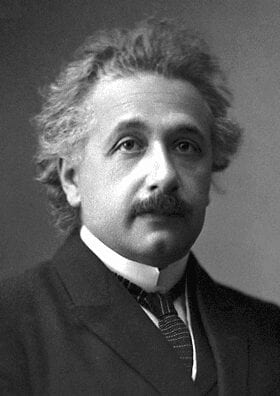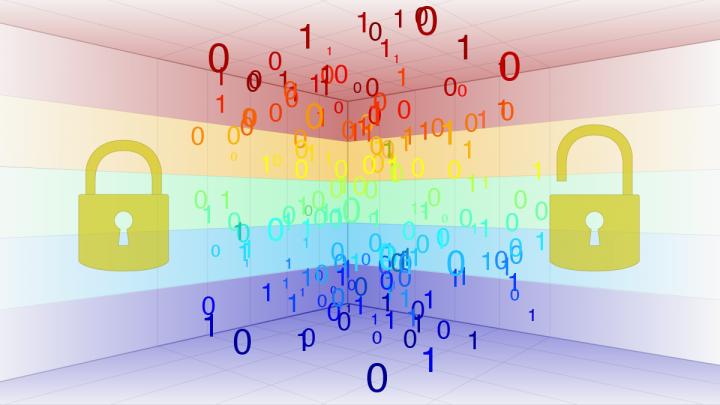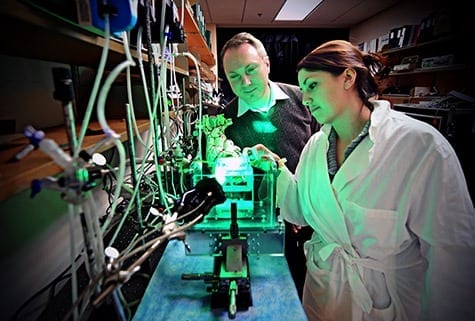
Einstein’s scepticism about quantum mechanics may lead to an ultra-secure internet suggests a new paper by researchers from Swinburne University of Technology and Peking University.
Associate Professor Margaret Reid from Swinburne’s Centre for Quantum and Optical Science said Einstein’s reservations about quantum mechanics were highlighted in a phenomenon known as “‘spooky’ action at a distance.”
In 1935 Einstein and researchers highlighted a ‘spooky’ theory in quantum mechanics, which is the strange way entangled particles stay connected even when separated by large distances.
“Until now the real application of this has been for messages being shared between two people securely without interception, regardless of the spatial separation between them,” Professor Reid said.
“In this paper, we give theoretical proof that such messages can be shared between more than two people and may provide unprecedented security for a future quantum internet.”
In the 1990s, scientists realised you can securely transmit a message through encrypting and using a shared key generated by Einstein’s strange entanglement to decode the message from the sender and receiver. Using the quantum key meant the message was completely secure from interception during transmission.
Sending Einstein’s entanglement to a larger number of people means the key can be distributed among all the receiving parties, so they must collaborate to decipher the message, which Professor Reid said makes the message even more secure.
“We found that a secure message can be shared by up to three to four people, opening the possibility to the theory being applicable to secure messages being sent from many to many.
“The message will also remain secure if the devices receiving the message have been tampered with, like if an iPhone were hacked, because of the nature of Einstein’s spooky entanglement.
“Discovering that it can be applied to a situation with more parties has the potential to create a more secure internet – with less messages being intercepted from external parties.”
The Latest on: Ultra-secure internet
[google_news title=”” keyword=”Ultra-secure internet” num_posts=”10″ blurb_length=”0″ show_thumb=”left”]
via Google News
The Latest on: Ultra-secure internet
- Robot security camera? House drone? My pet's best friend? Or just a vacuum? Either way, sign me up!on April 27, 2024 at 4:15 am
Home robot vacuum cleaners have been around for quite a while, iRobot Roomba being the one that most people think about when talking about such devices. However the market is way bigger now with more ...
- Area 51 has ultra-secure 'base within a base' where dazzling secret aircraft are tested, says expert whose home was raided over website revealing 'truth' of Nevada UFO baseon April 26, 2024 at 10:37 pm
Joerg Arnu has been running dreamlandresort.com since the early days of the Internet. The site was launched ... from the public's eyes at Area 51's ultra-secret enclave. Area 51, located 120 ...
- iPhone AI features in iOS 18 will be ultra-fast and secure, but there’s a downside tooon April 22, 2024 at 9:33 am
iOS 18 will be available with a handful of new AI features. At least, this is what the latest reports and rumors believe. In his latest Power On newsletter, Bloomberg‘s Mark Gurman reiterates ...
- Samsung Galaxy S24 Ultra Security Settings You Need to Change (Video)on April 21, 2024 at 5:00 pm
In a new video from Sakitech, we get to find out a range of security settings you should change on your Samsung Galaxy S24 Ultra, the excitement is palpable. But before you dive into its expansive ...
- Get Two Years of Ultimate Security for 5TB of Files on 10 Devices for Just $120on April 18, 2024 at 7:59 am
ElephantDrive cloud storage solution will protect your data with encryption, plus a hybrid combination of cloud services and NAS hardware devices.
- Cape Raises $61M to Build Ultra-Private and Secure Mobile Carrieron April 18, 2024 at 5:00 am
Cape, a pioneering privacy-first mobile carrier, has raised $61M in financing rounds led by A* and Andreessen Horowitz. XYZ Ventures, ex/ante, Costanoa Ventures, Point72 Ventures, Forward Deployed VC, ...
- How a Quantum Drum Could Change Everything About the Interneton April 16, 2024 at 11:03 am
Researchers at the University of Copenhagen’s Niels Bohr Institute have developed a new way to create quantum memory: A small drum can store data sent with light in its sonic vibrations, and then ...
- Internet can achieve quantum speed with light saved as soundon April 15, 2024 at 12:35 pm
The results demonstrate that mechanical memory for quantum data could be the strategy that paves the way for an ultra-secure internet with incredible speeds. The research is published in the ...
via Bing News










